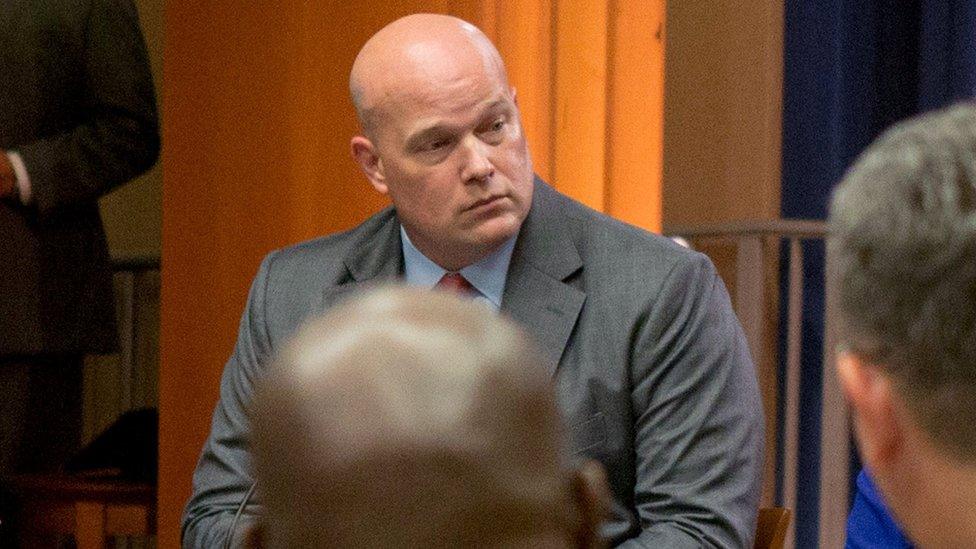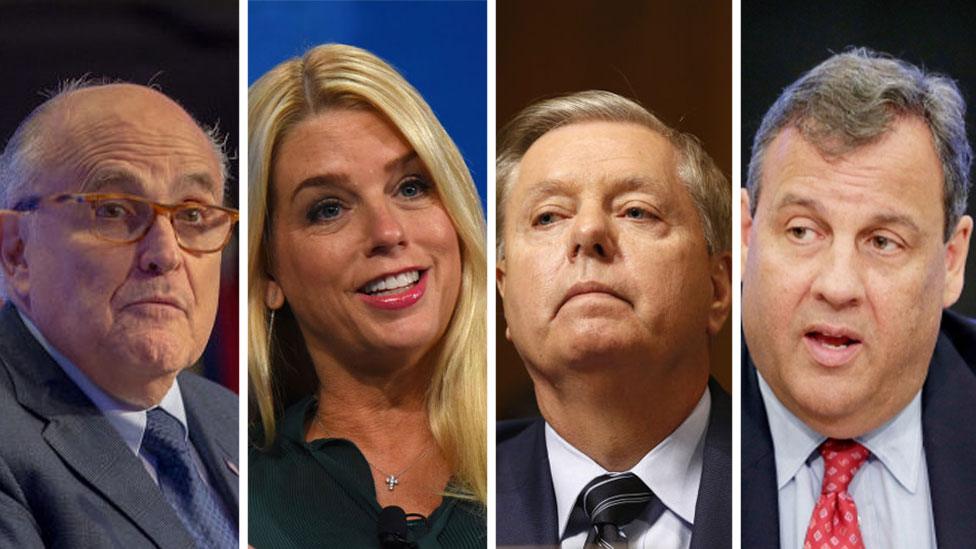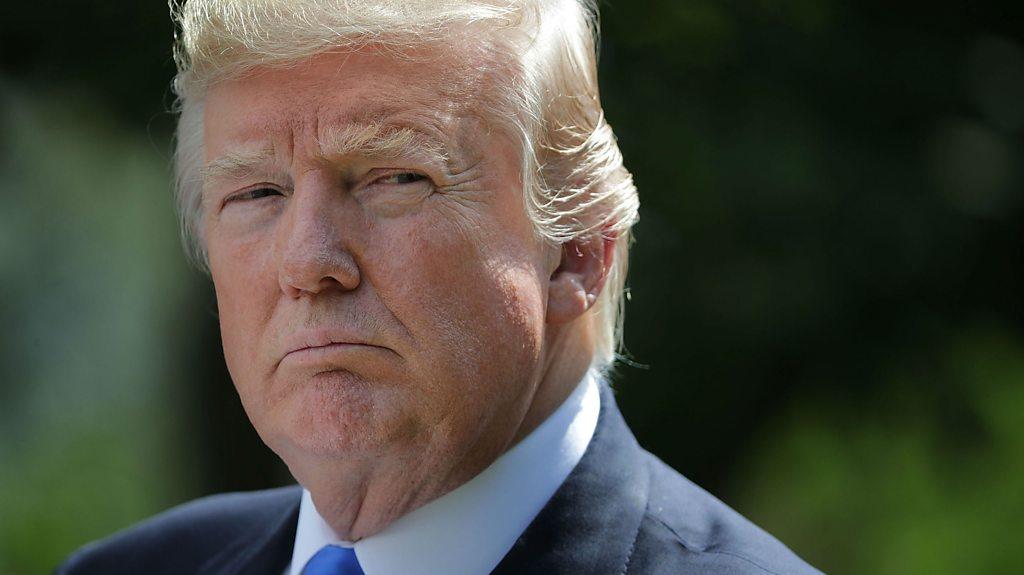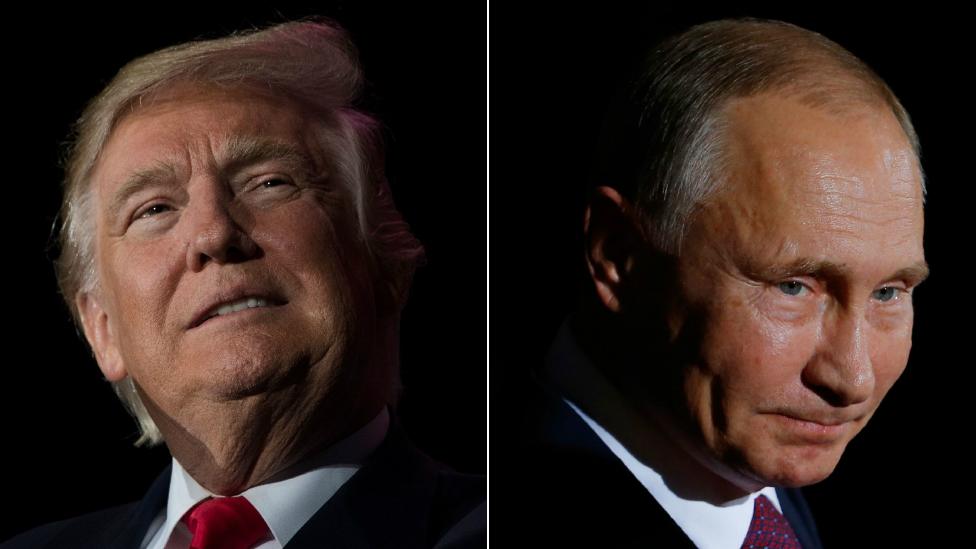Trump-Russia probe 'under threat' after Sessions fired
- Published
Staff applauded as Mr Sessions left the Department of Justice
The US inquiry into alleged Russian meddling during the 2016 election could be under threat after President Donald Trump fired Attorney General Jeff Sessions, top opposition Democrats say.
Nancy Pelosi, who leads Democrats in the House of Representatives, called the decision a "blatant attempt" to end or impede the investigation.
The probe has been criticised by Mr Sessions's successor Matthew Whitaker.
The Democrats, who won the House in the mid-terms, have vowed to protect it.
Some Republicans appear to have shared the Democrats' concern over the future of the inquiry, which is being led by Special Counsel Robert Mueller. Senator Susan Collins and Mitt Romney said it should not be impeded in any way.
Mr Mueller is investigating alleged collusion between the Trump campaign and Russia, resulting in a series of criminal charges against several Trump associates.
Mr Trump has vehemently denied any collusion took place, and repeatedly called for the inquiry to be shut down, calling it "the greatest political witch hunt in history".
Democrats see this latest move as an attempt to do just that.
Chuck Schumer: Timing of Sessions' firing 'suspect'
"It is impossible to read Attorney General Sessions' firing as anything other than another blatant attempt by @realDonaldTrump to undermine and end Special Counsel Mueller's investigation," Ms Pelosi - a front-runner to become speaker of the House of Representatives following this week's mid-terms - tweeted, external.
She went on to argue that, "given his record of threats to undermine and weaken the Russia investigation", Mr Whitaker should follow in Mr Sessions' footsteps and recuse himself.
Her words were echoed by Democratic party Senate leader Chuck Schumer, who added: "Clearly, the president has something to hide.", external
Why was Sessions fired?
The sacking followed months of Mr Trump criticising Mr Sessions, mainly for his decision to step aside from the Russia inquiry in March 2017.
Mr Sessions removed himself from the probe after Democrats accused him of failing to disclose contacts he had had with the Russian ambassador as a senior adviser to Mr Trump's campaign.
In July 2017 Mr Trump told the New York Times: "Sessions should have never recused himself, and if he was going to recuse himself, he should have told me before he took the job and I would have picked somebody else."
Relations between Trump and Sessions soured in 2017
In a resignation letter, Mr Sessions - a former Alabama senator who was an early supporter of Mr Trump - made clear the decision to go was not his own.
"Dear Mr President, at your request I am submitting my resignation," he wrote in an undated letter.
What happens now?
Mr Whitaker can now assume control of the Mueller inquiry, which has been overseen by Deputy Attorney General Rod Rosenstein until now.
The president cannot directly fire the special counsel. But Mr Sessions's replacement will have the power to do so, or end the inquiry.

Matthew Whitaker was announced as the acting attorney general
Mr Whitaker expressed concerns over the investigation. In August 2017, he wrote a piece for CNN in which he stated that looking into Mr Trump's personal finances, or those of his family, "goes beyond the scope, external of the appointment of the special counsel".
He went on to call on Mr Rosenstein to "order Mueller to limit the scope of the investigation" or risk the inquiry starting "to look like a political fishing expedition".
The deputy attorney general appointed Mr Mueller to lead the inquiry after Mr Trump fired FBI director James Comey in 2017.
The special counsel has also been investigating whether Mr Comey's firing amounted to obstruction of justice.
There has also been a question mark over Mr Rosenstein's future since it was alleged that he had discussed invoking a constitutional clause to oust President Trump.

What does this mean for the Mueller probe?
Analysis by Anthony Zurcher, BBC Washington
There had already been hints that Robert Mueller's pre-election "quiet period" was about to come to an end. And, in fact, if the former FBI director is as meticulous as he's reputed to be, he might have already made plans to deal with exactly this contingency.
That's stepping into the unknown, however.
What's certain is that if the special counsel tries to issue new indictments or expand his inquiry, Matthew Whitaker is now in a position to rebuff those requests. If Mr Mueller files a report detailing his conclusions, the new acting attorney general could keep the document from ever becoming public.
Those would be half-measures and insurance policies to limit damage. The president may also decide to instruct Mr Whitaker to fire the entire Mueller team - something Mr Trump says he has the power to do.
There's some doubt about whether the president is right, but with the mid-terms behind him he could be itching to settle this Mueller business once and for all. And he's one step closer to being able to do just that.
That almost certainly wouldn't be the end of this story, but it's the beginning of a new, fraught chapter.
Keep reading: Trump fires Jeff Sessions - is Robert Mueller next?

Possible attorney general candidates Rudy Giuliani (left), Pam Bondi (left-centre), Lindsey Graham (right-centre) and Chris Christie (right)
Who could replace him?
Mr Whitaker is not tipped to remain in the top role for long. Here's who else Mr Trump could be considering to fill the position more permanently:
Chris Christie: The 56-year-old ex-New Jersey governor briefly ran against Mr Trump in 2016 before becoming a stalwart supporter, leading the presidential transition team until he was dropped.
Pam Bondi: Florida's first female Attorney General Pam Bondi, 52, has been a longtime Trump friend who joined lawsuits against the Obama administration.
Lindsey Graham: The 63-year-old South Carolina Republican - who last year warned of "holy hell to pay" if the president fired Mr Sessions - is now a loyal Trump ally.
Rudy Giuliani: The president's current personal counsel and former New York mayor has previously been mentioned in connection with other roles, including secretary of state.
Other possible picks:
Janice Rogers Brown, 69, a conservative African American judge, is a former California Supreme Court Justice who retired from the DC federal courts in 2003
Alex Azar, 51, Health and Human Services Secretary, and Boeing vice-president J Michael Luttig, 64, both of whom clerked for conservative Supreme Court Justice Antonin Scalia
Bill Barr, 68, an ex-CIA analyst and former attorney general who served under President George H W Bush
- Published27 July 2017

- Published24 July 2019

- Published24 July 2019
